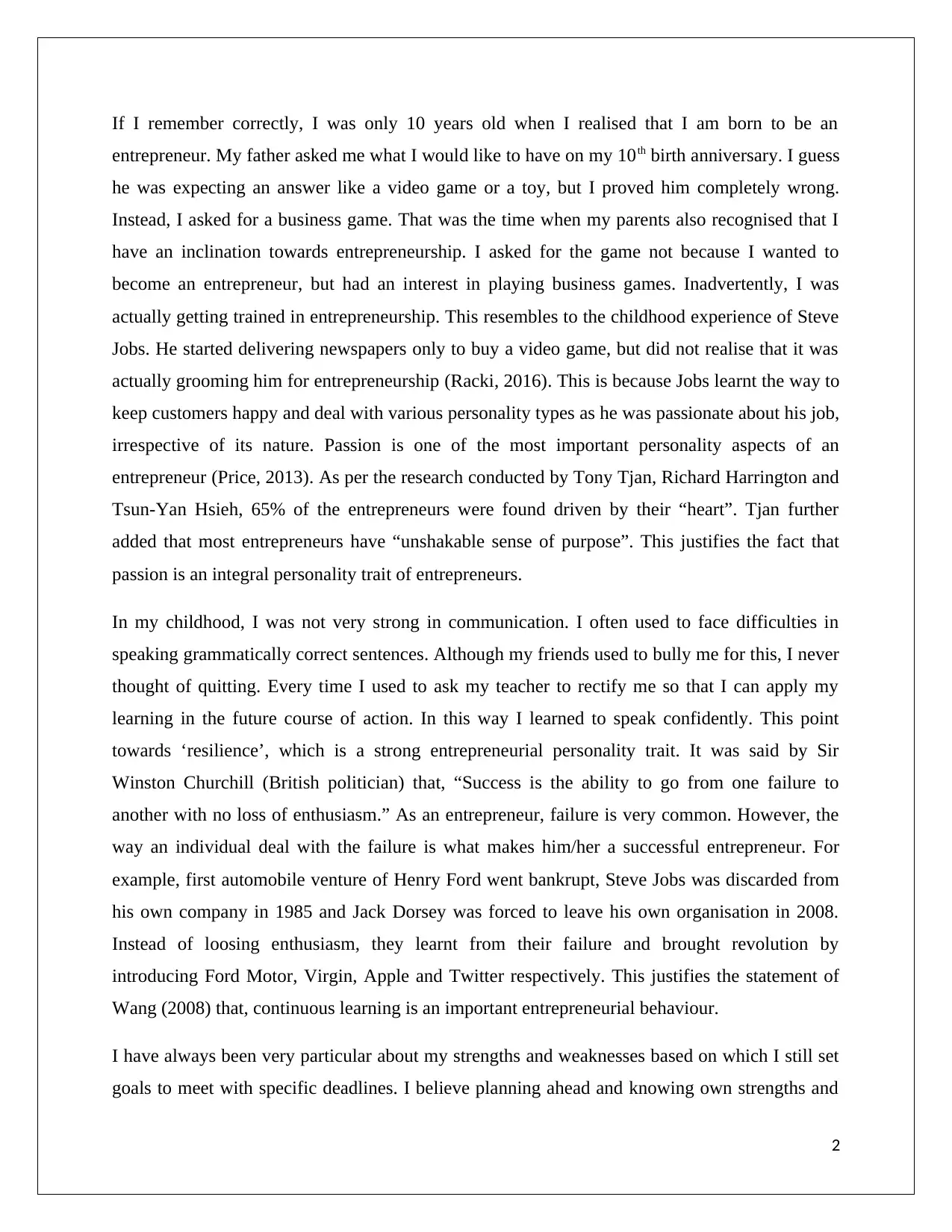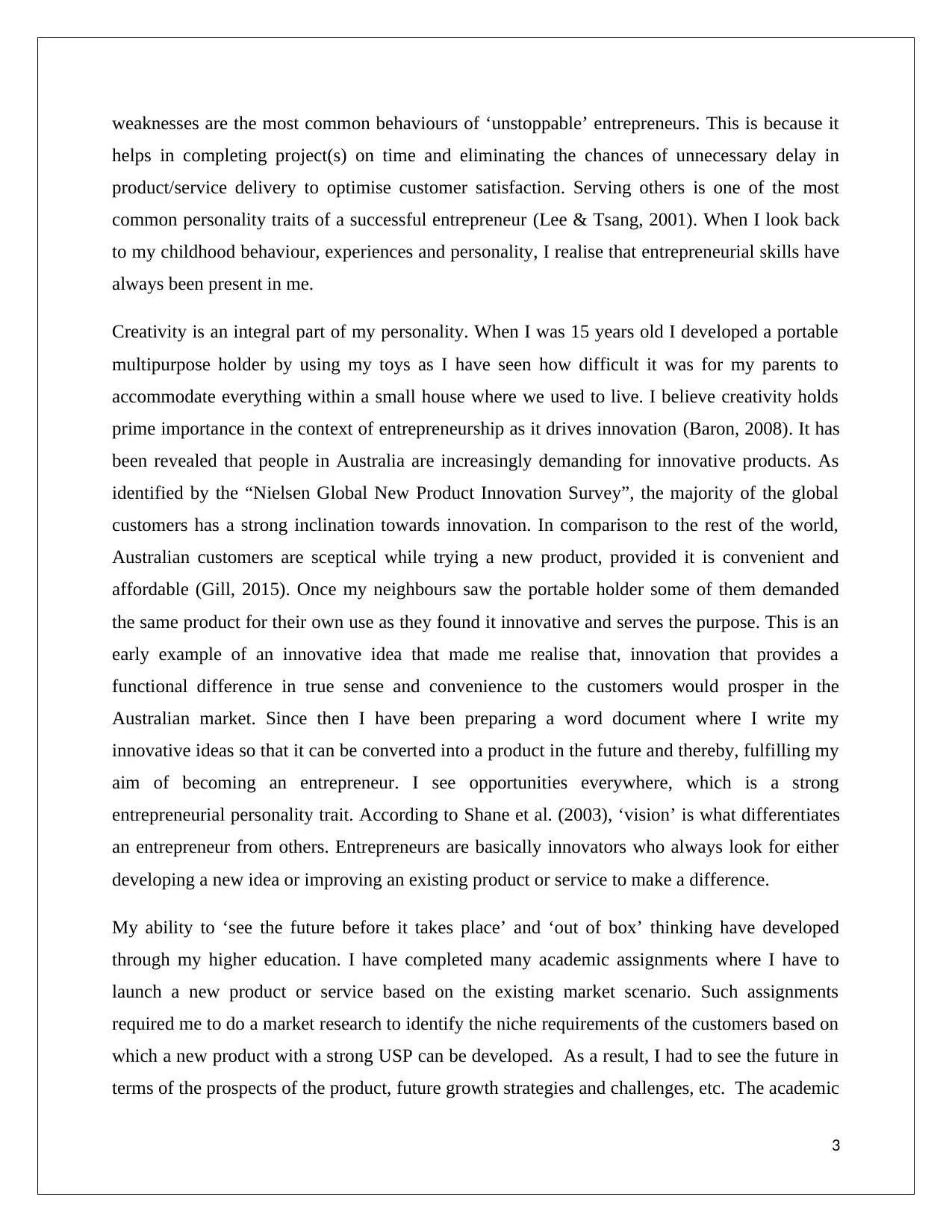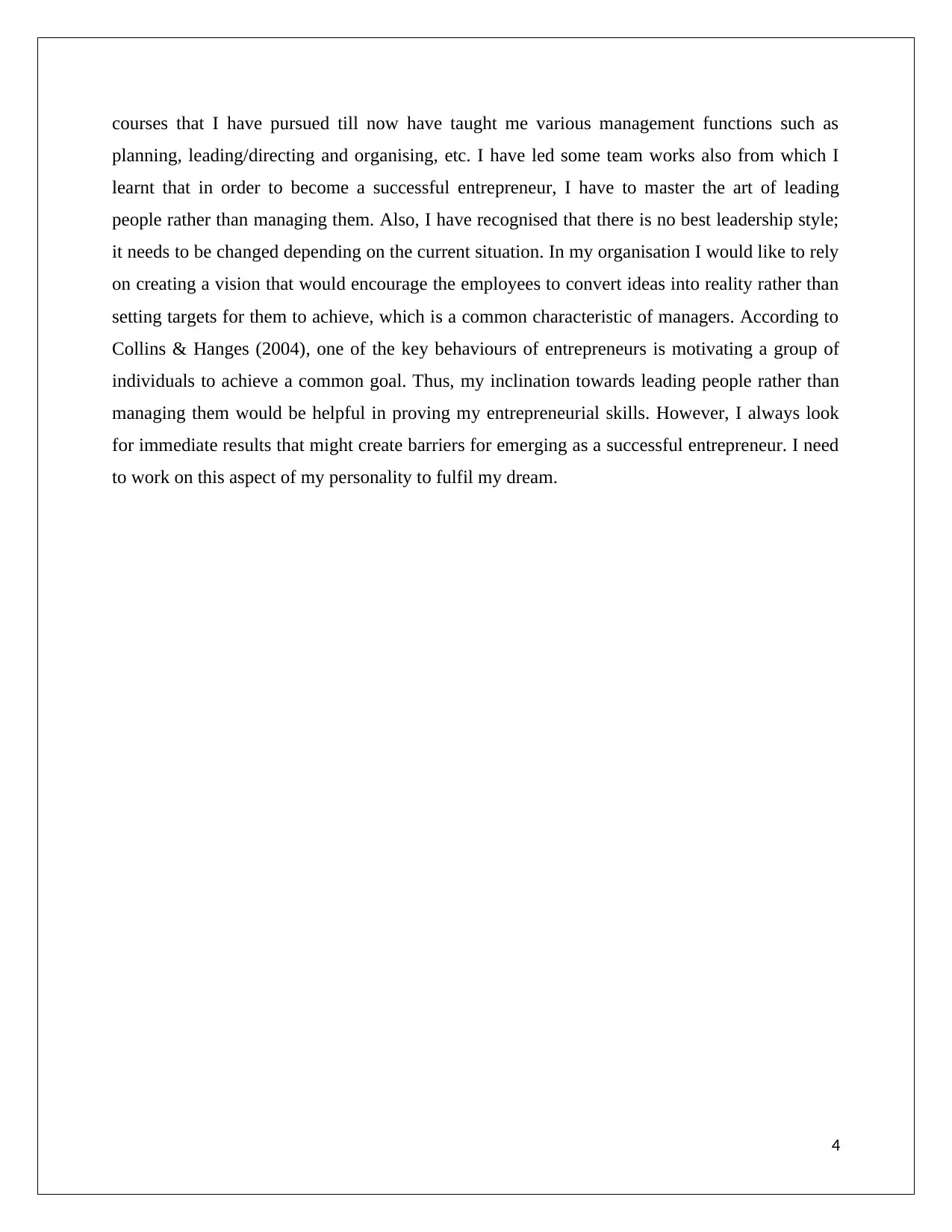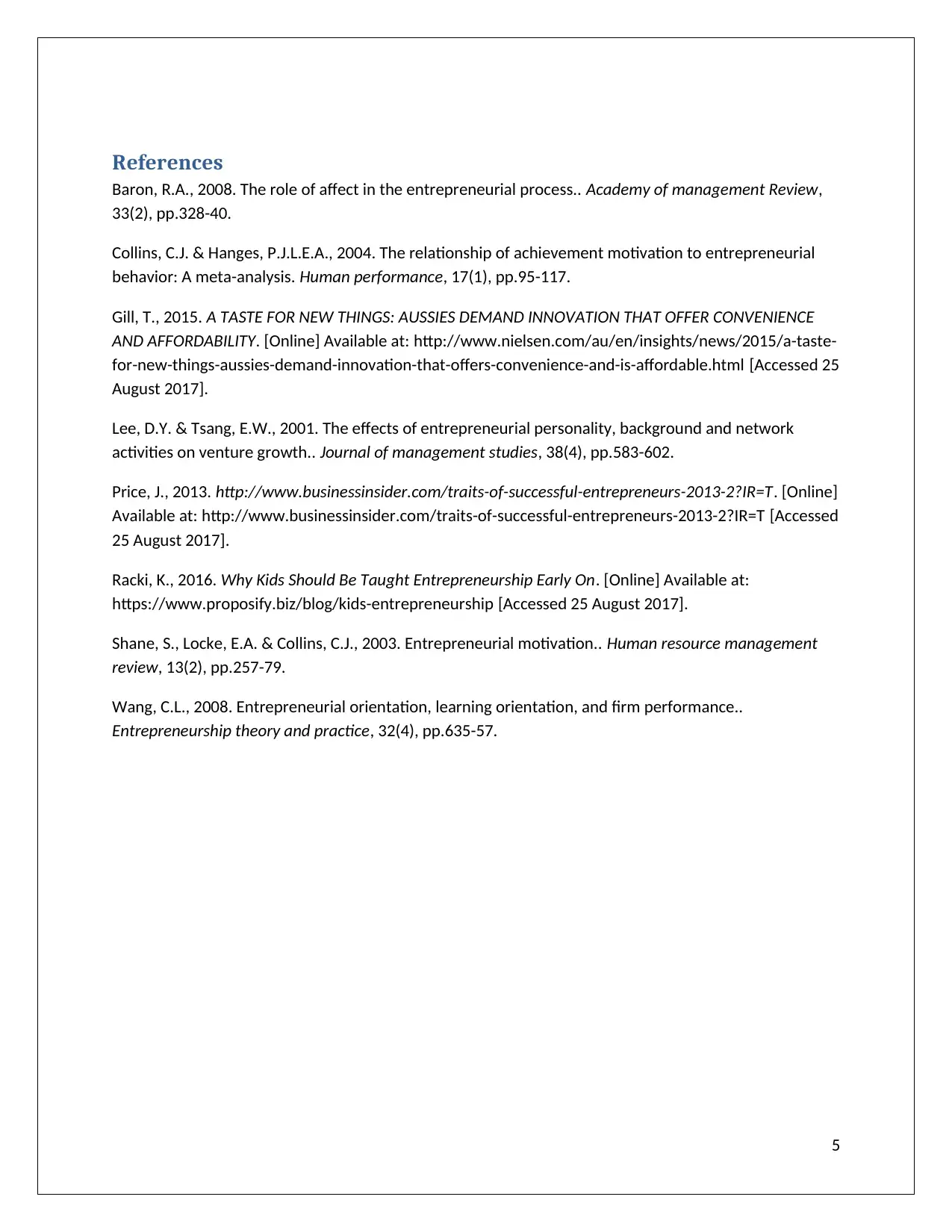From Childhood Dreams to Entrepreneurial Realities
VerifiedAdded on 2020/02/24
|5
|1475
|85
Essay
AI Summary
This essay provides a personal reflection on the author's entrepreneurial journey, tracing their interest back to childhood experiences. The author recounts how a passion for business games and early exposure to challenges like communication difficulties shaped their personality. The essay highlights key entrepreneurial traits such as passion, resilience, continuous learning, goal-oriented behavior, creativity, and the ability to identify opportunities. The author discusses how their academic pursuits and leadership experiences have further developed their vision and leadership skills. The essay concludes with a self-assessment, acknowledging the need to work on immediate result-oriented behavior to fully realize their entrepreneurial aspirations, emphasizing the importance of creating a vision that motivates employees.

ESSAY
1
1
Paraphrase This Document
Need a fresh take? Get an instant paraphrase of this document with our AI Paraphraser

If I remember correctly, I was only 10 years old when I realised that I am born to be an
entrepreneur. My father asked me what I would like to have on my 10th birth anniversary. I guess
he was expecting an answer like a video game or a toy, but I proved him completely wrong.
Instead, I asked for a business game. That was the time when my parents also recognised that I
have an inclination towards entrepreneurship. I asked for the game not because I wanted to
become an entrepreneur, but had an interest in playing business games. Inadvertently, I was
actually getting trained in entrepreneurship. This resembles to the childhood experience of Steve
Jobs. He started delivering newspapers only to buy a video game, but did not realise that it was
actually grooming him for entrepreneurship (Racki, 2016). This is because Jobs learnt the way to
keep customers happy and deal with various personality types as he was passionate about his job,
irrespective of its nature. Passion is one of the most important personality aspects of an
entrepreneur (Price, 2013). As per the research conducted by Tony Tjan, Richard Harrington and
Tsun-Yan Hsieh, 65% of the entrepreneurs were found driven by their “heart”. Tjan further
added that most entrepreneurs have “unshakable sense of purpose”. This justifies the fact that
passion is an integral personality trait of entrepreneurs.
In my childhood, I was not very strong in communication. I often used to face difficulties in
speaking grammatically correct sentences. Although my friends used to bully me for this, I never
thought of quitting. Every time I used to ask my teacher to rectify me so that I can apply my
learning in the future course of action. In this way I learned to speak confidently. This point
towards ‘resilience’, which is a strong entrepreneurial personality trait. It was said by Sir
Winston Churchill (British politician) that, “Success is the ability to go from one failure to
another with no loss of enthusiasm.” As an entrepreneur, failure is very common. However, the
way an individual deal with the failure is what makes him/her a successful entrepreneur. For
example, first automobile venture of Henry Ford went bankrupt, Steve Jobs was discarded from
his own company in 1985 and Jack Dorsey was forced to leave his own organisation in 2008.
Instead of loosing enthusiasm, they learnt from their failure and brought revolution by
introducing Ford Motor, Virgin, Apple and Twitter respectively. This justifies the statement of
Wang (2008) that, continuous learning is an important entrepreneurial behaviour.
I have always been very particular about my strengths and weaknesses based on which I still set
goals to meet with specific deadlines. I believe planning ahead and knowing own strengths and
2
entrepreneur. My father asked me what I would like to have on my 10th birth anniversary. I guess
he was expecting an answer like a video game or a toy, but I proved him completely wrong.
Instead, I asked for a business game. That was the time when my parents also recognised that I
have an inclination towards entrepreneurship. I asked for the game not because I wanted to
become an entrepreneur, but had an interest in playing business games. Inadvertently, I was
actually getting trained in entrepreneurship. This resembles to the childhood experience of Steve
Jobs. He started delivering newspapers only to buy a video game, but did not realise that it was
actually grooming him for entrepreneurship (Racki, 2016). This is because Jobs learnt the way to
keep customers happy and deal with various personality types as he was passionate about his job,
irrespective of its nature. Passion is one of the most important personality aspects of an
entrepreneur (Price, 2013). As per the research conducted by Tony Tjan, Richard Harrington and
Tsun-Yan Hsieh, 65% of the entrepreneurs were found driven by their “heart”. Tjan further
added that most entrepreneurs have “unshakable sense of purpose”. This justifies the fact that
passion is an integral personality trait of entrepreneurs.
In my childhood, I was not very strong in communication. I often used to face difficulties in
speaking grammatically correct sentences. Although my friends used to bully me for this, I never
thought of quitting. Every time I used to ask my teacher to rectify me so that I can apply my
learning in the future course of action. In this way I learned to speak confidently. This point
towards ‘resilience’, which is a strong entrepreneurial personality trait. It was said by Sir
Winston Churchill (British politician) that, “Success is the ability to go from one failure to
another with no loss of enthusiasm.” As an entrepreneur, failure is very common. However, the
way an individual deal with the failure is what makes him/her a successful entrepreneur. For
example, first automobile venture of Henry Ford went bankrupt, Steve Jobs was discarded from
his own company in 1985 and Jack Dorsey was forced to leave his own organisation in 2008.
Instead of loosing enthusiasm, they learnt from their failure and brought revolution by
introducing Ford Motor, Virgin, Apple and Twitter respectively. This justifies the statement of
Wang (2008) that, continuous learning is an important entrepreneurial behaviour.
I have always been very particular about my strengths and weaknesses based on which I still set
goals to meet with specific deadlines. I believe planning ahead and knowing own strengths and
2

weaknesses are the most common behaviours of ‘unstoppable’ entrepreneurs. This is because it
helps in completing project(s) on time and eliminating the chances of unnecessary delay in
product/service delivery to optimise customer satisfaction. Serving others is one of the most
common personality traits of a successful entrepreneur (Lee & Tsang, 2001). When I look back
to my childhood behaviour, experiences and personality, I realise that entrepreneurial skills have
always been present in me.
Creativity is an integral part of my personality. When I was 15 years old I developed a portable
multipurpose holder by using my toys as I have seen how difficult it was for my parents to
accommodate everything within a small house where we used to live. I believe creativity holds
prime importance in the context of entrepreneurship as it drives innovation (Baron, 2008). It has
been revealed that people in Australia are increasingly demanding for innovative products. As
identified by the “Nielsen Global New Product Innovation Survey”, the majority of the global
customers has a strong inclination towards innovation. In comparison to the rest of the world,
Australian customers are sceptical while trying a new product, provided it is convenient and
affordable (Gill, 2015). Once my neighbours saw the portable holder some of them demanded
the same product for their own use as they found it innovative and serves the purpose. This is an
early example of an innovative idea that made me realise that, innovation that provides a
functional difference in true sense and convenience to the customers would prosper in the
Australian market. Since then I have been preparing a word document where I write my
innovative ideas so that it can be converted into a product in the future and thereby, fulfilling my
aim of becoming an entrepreneur. I see opportunities everywhere, which is a strong
entrepreneurial personality trait. According to Shane et al. (2003), ‘vision’ is what differentiates
an entrepreneur from others. Entrepreneurs are basically innovators who always look for either
developing a new idea or improving an existing product or service to make a difference.
My ability to ‘see the future before it takes place’ and ‘out of box’ thinking have developed
through my higher education. I have completed many academic assignments where I have to
launch a new product or service based on the existing market scenario. Such assignments
required me to do a market research to identify the niche requirements of the customers based on
which a new product with a strong USP can be developed. As a result, I had to see the future in
terms of the prospects of the product, future growth strategies and challenges, etc. The academic
3
helps in completing project(s) on time and eliminating the chances of unnecessary delay in
product/service delivery to optimise customer satisfaction. Serving others is one of the most
common personality traits of a successful entrepreneur (Lee & Tsang, 2001). When I look back
to my childhood behaviour, experiences and personality, I realise that entrepreneurial skills have
always been present in me.
Creativity is an integral part of my personality. When I was 15 years old I developed a portable
multipurpose holder by using my toys as I have seen how difficult it was for my parents to
accommodate everything within a small house where we used to live. I believe creativity holds
prime importance in the context of entrepreneurship as it drives innovation (Baron, 2008). It has
been revealed that people in Australia are increasingly demanding for innovative products. As
identified by the “Nielsen Global New Product Innovation Survey”, the majority of the global
customers has a strong inclination towards innovation. In comparison to the rest of the world,
Australian customers are sceptical while trying a new product, provided it is convenient and
affordable (Gill, 2015). Once my neighbours saw the portable holder some of them demanded
the same product for their own use as they found it innovative and serves the purpose. This is an
early example of an innovative idea that made me realise that, innovation that provides a
functional difference in true sense and convenience to the customers would prosper in the
Australian market. Since then I have been preparing a word document where I write my
innovative ideas so that it can be converted into a product in the future and thereby, fulfilling my
aim of becoming an entrepreneur. I see opportunities everywhere, which is a strong
entrepreneurial personality trait. According to Shane et al. (2003), ‘vision’ is what differentiates
an entrepreneur from others. Entrepreneurs are basically innovators who always look for either
developing a new idea or improving an existing product or service to make a difference.
My ability to ‘see the future before it takes place’ and ‘out of box’ thinking have developed
through my higher education. I have completed many academic assignments where I have to
launch a new product or service based on the existing market scenario. Such assignments
required me to do a market research to identify the niche requirements of the customers based on
which a new product with a strong USP can be developed. As a result, I had to see the future in
terms of the prospects of the product, future growth strategies and challenges, etc. The academic
3
⊘ This is a preview!⊘
Do you want full access?
Subscribe today to unlock all pages.

Trusted by 1+ million students worldwide

courses that I have pursued till now have taught me various management functions such as
planning, leading/directing and organising, etc. I have led some team works also from which I
learnt that in order to become a successful entrepreneur, I have to master the art of leading
people rather than managing them. Also, I have recognised that there is no best leadership style;
it needs to be changed depending on the current situation. In my organisation I would like to rely
on creating a vision that would encourage the employees to convert ideas into reality rather than
setting targets for them to achieve, which is a common characteristic of managers. According to
Collins & Hanges (2004), one of the key behaviours of entrepreneurs is motivating a group of
individuals to achieve a common goal. Thus, my inclination towards leading people rather than
managing them would be helpful in proving my entrepreneurial skills. However, I always look
for immediate results that might create barriers for emerging as a successful entrepreneur. I need
to work on this aspect of my personality to fulfil my dream.
4
planning, leading/directing and organising, etc. I have led some team works also from which I
learnt that in order to become a successful entrepreneur, I have to master the art of leading
people rather than managing them. Also, I have recognised that there is no best leadership style;
it needs to be changed depending on the current situation. In my organisation I would like to rely
on creating a vision that would encourage the employees to convert ideas into reality rather than
setting targets for them to achieve, which is a common characteristic of managers. According to
Collins & Hanges (2004), one of the key behaviours of entrepreneurs is motivating a group of
individuals to achieve a common goal. Thus, my inclination towards leading people rather than
managing them would be helpful in proving my entrepreneurial skills. However, I always look
for immediate results that might create barriers for emerging as a successful entrepreneur. I need
to work on this aspect of my personality to fulfil my dream.
4
Paraphrase This Document
Need a fresh take? Get an instant paraphrase of this document with our AI Paraphraser

References
Baron, R.A., 2008. The role of affect in the entrepreneurial process.. Academy of management Review,
33(2), pp.328-40.
Collins, C.J. & Hanges, P.J.L.E.A., 2004. The relationship of achievement motivation to entrepreneurial
behavior: A meta-analysis. Human performance, 17(1), pp.95-117.
Gill, T., 2015. A TASTE FOR NEW THINGS: AUSSIES DEMAND INNOVATION THAT OFFER CONVENIENCE
AND AFFORDABILITY. [Online] Available at: http://www.nielsen.com/au/en/insights/news/2015/a-taste-
for-new-things-aussies-demand-innovation-that-offers-convenience-and-is-affordable.html [Accessed 25
August 2017].
Lee, D.Y. & Tsang, E.W., 2001. The effects of entrepreneurial personality, background and network
activities on venture growth.. Journal of management studies, 38(4), pp.583-602.
Price, J., 2013. http://www.businessinsider.com/traits-of-successful-entrepreneurs-2013-2?IR=T. [Online]
Available at: http://www.businessinsider.com/traits-of-successful-entrepreneurs-2013-2?IR=T [Accessed
25 August 2017].
Racki, K., 2016. Why Kids Should Be Taught Entrepreneurship Early On. [Online] Available at:
https://www.proposify.biz/blog/kids-entrepreneurship [Accessed 25 August 2017].
Shane, S., Locke, E.A. & Collins, C.J., 2003. Entrepreneurial motivation.. Human resource management
review, 13(2), pp.257-79.
Wang, C.L., 2008. Entrepreneurial orientation, learning orientation, and firm performance..
Entrepreneurship theory and practice, 32(4), pp.635-57.
5
Baron, R.A., 2008. The role of affect in the entrepreneurial process.. Academy of management Review,
33(2), pp.328-40.
Collins, C.J. & Hanges, P.J.L.E.A., 2004. The relationship of achievement motivation to entrepreneurial
behavior: A meta-analysis. Human performance, 17(1), pp.95-117.
Gill, T., 2015. A TASTE FOR NEW THINGS: AUSSIES DEMAND INNOVATION THAT OFFER CONVENIENCE
AND AFFORDABILITY. [Online] Available at: http://www.nielsen.com/au/en/insights/news/2015/a-taste-
for-new-things-aussies-demand-innovation-that-offers-convenience-and-is-affordable.html [Accessed 25
August 2017].
Lee, D.Y. & Tsang, E.W., 2001. The effects of entrepreneurial personality, background and network
activities on venture growth.. Journal of management studies, 38(4), pp.583-602.
Price, J., 2013. http://www.businessinsider.com/traits-of-successful-entrepreneurs-2013-2?IR=T. [Online]
Available at: http://www.businessinsider.com/traits-of-successful-entrepreneurs-2013-2?IR=T [Accessed
25 August 2017].
Racki, K., 2016. Why Kids Should Be Taught Entrepreneurship Early On. [Online] Available at:
https://www.proposify.biz/blog/kids-entrepreneurship [Accessed 25 August 2017].
Shane, S., Locke, E.A. & Collins, C.J., 2003. Entrepreneurial motivation.. Human resource management
review, 13(2), pp.257-79.
Wang, C.L., 2008. Entrepreneurial orientation, learning orientation, and firm performance..
Entrepreneurship theory and practice, 32(4), pp.635-57.
5
1 out of 5
Related Documents
Your All-in-One AI-Powered Toolkit for Academic Success.
+13062052269
info@desklib.com
Available 24*7 on WhatsApp / Email
![[object Object]](/_next/static/media/star-bottom.7253800d.svg)
Unlock your academic potential
Copyright © 2020–2026 A2Z Services. All Rights Reserved. Developed and managed by ZUCOL.





